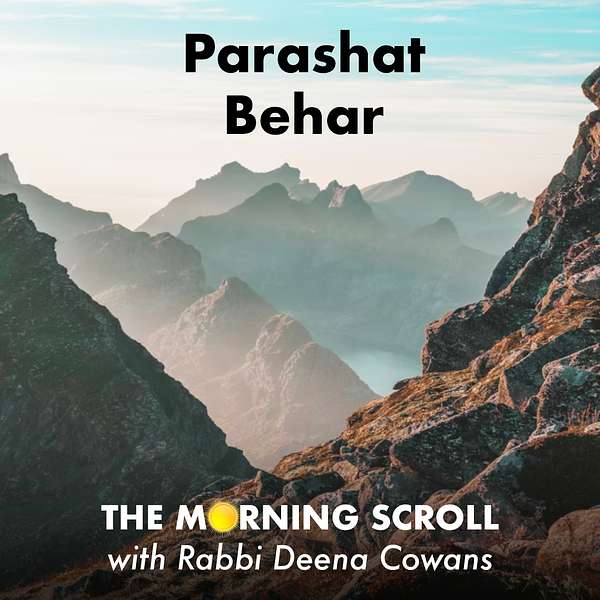
The Morning Scroll
The Morning Scroll
Parashat Behar, May 19th
Use Left/Right to seek, Home/End to jump to start or end. Hold shift to jump forward or backward.
This week's parsha has confusingly little to do with beloved television personality Joy Behar, but it does invite us to ask ourselves what constitutes a joyful life. Rabbi Deena thinks it might involve getting to know your neighbors.
Today's episode is sponsored by Broadway In Chicago. Tickets are available now to Fiddler on the Roof at the Cadillac Palace Theatre, from May 17th - 22nd. Use Mishkan's special offer code ROOF45 for $45 Middle Balcony tickets.
Produced by Mishkan Chicago. Music composed, produced, and performed by Kalman Strauss. See our upcoming Shabbat services and programs here, and follow us on Instagram and like us on Facebook for more updates. Check out Shabbat Replay on Contact Chai for more from Rabbi Deena.
Transcript
Welcome to The Morning Scroll! I'm Rabbi Deena Cowans from Mishkan Chicago and you're listening to what will be a quick dive into this week's parsha. If you’ve been meaning to brush up on your Jewish literacy, or you’re looking for some inspiration, you’ve come to the right place. This week, we read Parashat Behar, “on the mountain”,. We’ll start with a brief recap:
God reminds Moshe of the laws of shmita, letting the land rest every seven years, and yovel, a once every 50 year reset for people, plants, animals and money. Since all land reverts to its original owner every yovel, the price of land sales is meant to take into account the amount of time until the next yovel, and we’re told that this law is to remind us that God ultimately owns all land, not humans. We’re also commanded to conduct business ethically and not verbally harass or scam people. The parsha then talks about how we will survive a shmita year without planting, assuring us that god will care for us. There’s also a set of laws about redeeming land that has been sold, including how to calculate the redemption price based on the number of years until the yovel and the time that has passed since the sale. All this only applies in fields and un-walled cities. In walled cities, the seller has one year to redeem their property from the sale, at which point its ownership is permanently transferred and doesn’t go back at yovel. We’re also commanded to help out others so they don’t become financially ruined, not to charge interest on a loan, and to treat slaves with respect. Finally, we learn how to redeem a relative who has been sold into slavery, and are yet again reminded not to worship idols, and to observe Shabbat.
If this parsha had a theme, it would be “impermanence”. The laws of shmita and yovel, which relate to the agricultural cyle, yes, but also to financial transactions and land ownership and even slavery, things that we now think of as a permanent change. What is so interesting to me about this parsha, though, is that we see echoes of our financial system in the parsha itself- the laws of shmita and yovel only apply in un-walled cities, which were at the time more like villages and rural areas. The cities were, already in the Torah, living a more capitalist, commerce based lifestyle where your house was your dwelling place but likely not your ancestral home. Meaning, the Torah already had different sorts of laws depending on what kind of life you were living. People who were living in urban areas and engaging in the exchange of goods and services were, by law, less tied to their place, and to their neighbors. People who lived in less built up environments were, by law, more tied to their land and their neighbors, because they were, once a generation, returning to their original homes and engaging in financial transactions that required societal cooperation, like redeeming others from slavery or buying back a family home.
The Torah doesn’t seem to have a preference between these two ways of life. The parsha devotes significantly more time to the non-urban laws, but that may have been because more people lived that way. The Torah seems to be saying that “people live in different ways so let’s just think about how to create just and organized societies that fit how people live.” Which leaves room for us to say, “Ok, so how do I think it is best to live?” For some people, that means living connected to the land and others, but it might not. What matters is that, however we live, or wherever we live, that we are thoughtful and deliberate about how we interact with our environment, and our neighbors. Things can always change, this parsha reminds us. So don’t get too attached to any one place or thing. Rather, be attached to your community, your identity.
With this in mind, I want to offer a blessing to the Israelites who had to move out of their homes in a yovel year to return them back to their neighbors. Even if we know things are impermanent, change is hard, and the kinds of social bonds that would allow this system to work required deep relationships of trust and care. And I want to extend that blessing to you, as a reminder to get to know your neighbors. Even just knowing their names, or a little about them, can help us feel more safe and rooted, which leads to more peace, and more justice.